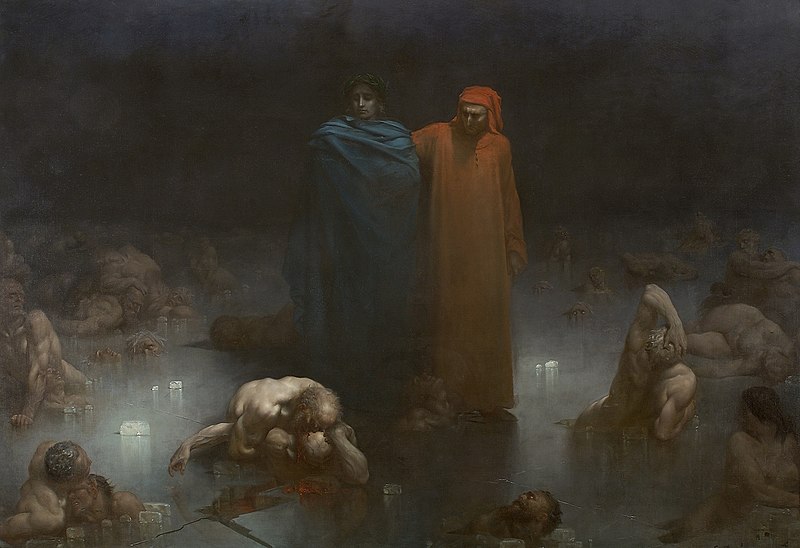
Wednesday
I have joined a faculty group to explore Dante’s Divine Comedy. This past week four of us met—properly social distanced of course—and made our way through the first two cantos. (For those of you who know Sewanee, the group includes retired English faculty John Reishman and John Gatta and Renaissance scholar Ross MacDonald.) Given my view of literature, I focused on how reading came to Dante’s rescue at one of his darkest hours.
Dante turns to his favorite author when he is lost in his dark wood. Think of it as Better Living through Virgil. When I was writing about Wilkie Collins’s The Moonstone, I looked at a character who uses Robinson Crusoe to solve every problem that comes his way, and Dante is doing something similar. Virgil, after all, describes Aeneas journeying through the afterlife at a stage in his life where he’s uncertain about which way to turn. Dante is in a comparable situation and uses the underworld journey as his model.
To dramatize Dante’s situation, I turn to Christopher Marlowe’s Dr. Faustus when he is experiencing a dark woods moment of his own. Having cut himself off from God, Faustus is suicidally depressed, but his pride won’t allow him to repent. If it weren’t for the poetry of Homer (the story of Alexander/Paris and Oenon, whom he jilted) and the music of Orpheus, Faustus would find a weapon to “dispatch” himself:
My heart’s so hardened I cannot repent!
Scarce can I name salvation, faith, or heaven,
But fearful echoes thunders in mine ears,
“Faustus, thou are damned”; then swords and knives,
Poison, guns, halters, and envenomed steel
Are laid before me to dispatch myself:
And long ere this I should have slain myself,
Had not sweet pleasure conquered deep espair.
Have I not made blind Homer sing to me
Of Alexander’s love, and Oenon’s death.
And hath not he that built the walls of Thebes
With ravishing sound of his melodious harp,
Made music with my Mephastophilis?
Why should I die then, or basely despair?
In other words, art as suicide prevention.
Dante may not be suicidal, but he’s very, very low at the point where Virgil comes to his aid. First there is deep depression:
Midway in our life’s journey, I went astray from the straight road and woke to find myself alone in a dark wood. How shall I say what wood that was! I never saw so drear, so rank, so arduous a wilderness! Its very memory gives a shape to fear. Death could scarce be more bitter than that place!... How I came to it I cannot rightly say, so drugged and loose with sleep had I become when I first wandered there from the True Way. (John Ciardi trans.)
In this state, he catches a momentary gleam of God’s love:
But at the far end of that valley of evil whose maze had sapped my very heart with fear! I found myself before a little hill and lifted up my eyes. Its shoulders glowed already with the sweet rays of that planet [the sun] whose virtue leads men straight on every road and the shining strengthened me against the fright whose agony had wracked the lake of my heart through all the terrors of that piteous night.
Despite his resolution to march up the hill—to leave his funk and open himself to God—Dante then encounters three beasts that drive him back into his dark woods state. Think of them as symbols of his sins and sense of inadequacy:
She [the She-Wolf] brought such heaviness upon my spirit
at sight of her savagery and desperation,
I died from every hope of that high summit.
And like a miser—eager in acquisition
but desperate in self-reproach when Fortune’s wheel
turns to the hour of his loss—all tears and attrition
I wavered back; and still the beast pursued,
forcing herself against me bit by bit
till I slid back into the sunless wood.
It is at this point that he remembers his beloved Virgil, although he at first doesn’t recognize him. After a lifetime of reading, we know there may be someone out there who understands our condition, even if we’re not at first sure who it is. Gradually it comes to us:
And as I fell to my soul’s ruin, a presence gathered before me on the discolored air, the figure of one who seemed hoarse from long silence. At sight of him in that friendless waste I cried: “Have pity on me, whatever thing you are, whether shade or living man.”
Our most beloved authors are both shades and living people, shades in that they play an outsized role in our imaginations. Virgil reassures Dante that he will help him grapple with his inner darkness:
Therefore, for your own good, I think it well
you follow me and I will be your guide
and lead you forth through an eternal place.
There you shall see the ancient spirits tried
in endless pain, and hear their lamentation
as each bemoans the second death of souls.
Virgil has one drawback: having lived before the birth of Christ, he can’t guide Dante fully into an understanding of God’s redeeming love. He has an inkling, however: Dante believes that Virgil’s Eclogue anticipates Christ’s vision. He captures this by having Virgil report he has been sent by three heavenly ladies: the Virgin Mary, Dante’s muse Beatrice, and the figure Lucia, representing Divine Light.
The combination of Virgil’s worldly knowledge and Christianity’s divine love will lead Dante out of the woods and into the light.

